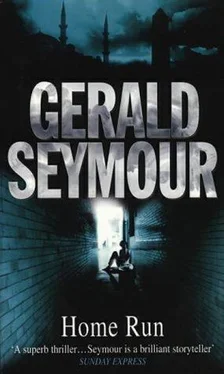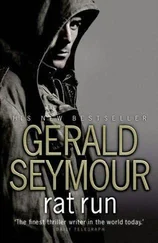Gerald Seymour - Home Run
Здесь есть возможность читать онлайн «Gerald Seymour - Home Run» весь текст электронной книги совершенно бесплатно (целиком полную версию без сокращений). В некоторых случаях можно слушать аудио, скачать через торрент в формате fb2 и присутствует краткое содержание. Жанр: Триллер, на английском языке. Описание произведения, (предисловие) а так же отзывы посетителей доступны на портале библиотеки ЛибКат.
- Название:Home Run
- Автор:
- Жанр:
- Год:неизвестен
- ISBN:нет данных
- Рейтинг книги:5 / 5. Голосов: 1
-
Избранное:Добавить в избранное
- Отзывы:
-
Ваша оценка:
- 100
- 1
- 2
- 3
- 4
- 5
Home Run: краткое содержание, описание и аннотация
Предлагаем к чтению аннотацию, описание, краткое содержание или предисловие (зависит от того, что написал сам автор книги «Home Run»). Если вы не нашли необходимую информацию о книге — напишите в комментариях, мы постараемся отыскать её.
Home Run — читать онлайн бесплатно полную книгу (весь текст) целиком
Ниже представлен текст книги, разбитый по страницам. Система сохранения места последней прочитанной страницы, позволяет с удобством читать онлайн бесплатно книгу «Home Run», без необходимости каждый раз заново искать на чём Вы остановились. Поставьте закладку, и сможете в любой момент перейти на страницу, на которой закончили чтение.
Интервал:
Закладка:
He had not always been a recluse. He had once known how to polish boots. He had known how to pour and serve a pink gin with the right measure of bitters, and he had been familiar with the formation of a platoon sized unit in attack, and he had once stood at attention an arm's length from the Shah of Shahs. Majid Nazeri had risen to sergeant in Charlie Eshraq's grandfather's regiment, and he had been batman to Charlie's father. The day that Charlie's father had been arrested, he had started the journey from Tehran to Tabriz, and then travelled on, northwards, in search of a place where he could shut out the abomination of what happened on the lower ground beneath him.
It was two years since the young Eshraq, the quiet man replacing his memory of a noisy boy, had reached his home on Iri Dagh, found him.
Always, when Charlie came to him and then left him, he wondered whether he would see the young man again. Always when Charlie left him, after they had exchanged their gruff farewells, there was a wet rheum in his old eyes. It was of small concern to him that his once keen sight was sliding from him. His dogs were his sight, and as his eyes faded so also disappeared the hazed outline of the city of Tabriz. Charlie had told him that it was in the city of Tabriz, in front of the headquarters of the Revolutionary Guards, that Miss Juliette had been hanged. He had no more wish to see the grey outline of the minaret towers of Tabriz.
To Majid Nazeri, his life winnowing away, Charlie was an angel of revenge. To the old soldier, loyal servant and batman, Charlie was the last of a line he had worshipped.
He pulled open the door of the shed. He had old rags in his hand, the remnant of an army shirt that had rotted on his back.
He spent all of that afternoon polishing the petrol tank, and the wheel spokes, and the engine work of the Japanese motorcycle that was Charlie's. The motorcycle did not need i leaning, and by the time that Charlie had next taken it down the stone track to the road running from Ahar into Tabriz then it would be filthy. And after he had cleaned the motorcycle he checked that the blocks on which it was raised to protect the tyres were firmly in position. He never knew, never asked, when Charlie would next be hammering at his door, shouting lor admission, squeezing the breath out of his old body.
He picked up the discarded two parts of a blue tracksuit, and he took them to the stream beside his house for washing.
The dusk was closing in. He did not have to go to his bed of rugs and furs as soon as the darkness came. Charlie had brought him kerosene for the lamp hanging off the central beam of his main room. He could sit on his wooden chair, and long after the night had come to the slopes of Iri Dagh, and the dogs outside had started their chorus to keep away the wolves from the animals' stockade, he would gaze at his most prized possession. He would stare at the gilt framed photograph of the army officer and his foreign wife and their two children.
The joy of Majid Nazeri's life was Charlie Eshraq's corning, his despair was Charlie Eshraq's going.
He had reverted to the clothes of a pasdar.
He was sleeping towards the back of the Mercedes bus.
Several times he was jolted awake by the man sitting next to him, because the Guards had stopped the bus at a block and were checking papers. His own papers were in order. Like every Iranian he carried with him at all times his Shenass-Nameh, his Recognition Papers. The Recognition Papers listed a false name, a false date of birth, a false record of military service in the Guards. The papers aroused no suspicion. He was unarmed, he had nothing to fear from a search of his one small bag. He had been wounded in the service of his country, he had been home on convalescent leave to the home of his parents in the fine city of Tabriz, he was returning to Tehran where his unit was to be re-formed.
He was greeted with friendship by the Guards who searched the bus.
The bus stopped at a cafe. Charlie dozed on. He had no wish to queue for food. He had eaten well at the home of Majid Nazeri early in the morning. To be hungry was to be alert, and it was sensible of him to sleep because in the morning the bus would arrive in Tehran.
He had the signature of the Mullah on his proposals for action.
The investigator only proposed. The Mullah, whose signature and office stamp were on the document, had been chosen with care by the investigator. He knew his man, he knew which cleric could be trusted to rise, a trout in a waterway in the Elborz hills.
It was late in the night. The room in which the investigator worked was without decoration, save for the portrait of the Imam. So different from the office he had occupied when he had been the trusted servant of a plucked Peacock. No carpet now, no drinks cabinet, no easy chairs, no colour television.
In the struggles waged amongst the Ayatollahs and the Mullahs in the twilight months of the Imam's life the investigator did not believe the dice would fall for those who were described as the Pragmatists, the Realists, the Moderates. He believed that the victors would be men such as the Mullah, whose signature he had on the two proposals.
The city was quiet below him. He telephoned to the Manzarieh camp on the northern outskirts of the capital. He waited for the telephone to be answered in the building that was once the hostel of the Empress Farah University of Girls and was now the Revolutionary Centre of the Volunteers for Martyrdom.
5
She was different, but she was the only girl amongst them.
He had been given short shrift by the boys. She wore no make-up, and her dark hair was combed away from a centre parting, and she had discarded the headscarf that would have been obligatory out on the street, and she wore the jeans and the blouse that would have to be covered by a chador.
"I might have been away, OK, I've been away, but that wasn't my decision. I was taken away. Now I am able to make my own choice, and that choice is to come back and live my life inside Iran."
They had all been his friends, the boys and the girl, at the American School. The name of the girl was La'ayya. Charlie sat on a straight-backed chair and the girl lounged on the wide sofa. This was the reception room of the villa of her parents, Before the Revolution there would have been framed photographs of La'ayya's father, about his official business, and with minor members of the First Family. The images of the other life were gone, along with the servants and gardeners.
Her parents were taking the last of the snow on the ski slopes above the Caspian Sea. The girl was alone in the villa that was set back from the wide street, where the cherry blossom was starting to bloom, and she was amused, and not frightened as the boys had been.
"I went with my mother to California. I loathed it. I was sent to London, where we have friends. I live there, but I hate that city too. I am Iranian and I want to make my life in the country that is my home."
He had said the same to the boys. None of them had wanted to hear him out. He had been given little chance to talk in any one of the boys' homes before being shown the door, but the girl was in no hurry to expel him. She had always had more guts than any of the boys in his class. Now she smiled frankly at him.
"You don't believe me?"
"I'm not a fanatic, Charlie. I don't pray for the eternal life of Khomeini. I just exist here. If anyone tells me that they want to live here when they have the chance to live in California or London then I think that either they are addled in the head, or they are lying."
"But you haven't thrown me out, the madman or the liar.
The others were fast enough."
"Your father was killed, and your sister, and you talk about coming back as if it were the matter of crossing a street…
Читать дальшеИнтервал:
Закладка:
Похожие книги на «Home Run»
Представляем Вашему вниманию похожие книги на «Home Run» списком для выбора. Мы отобрали схожую по названию и смыслу литературу в надежде предоставить читателям больше вариантов отыскать новые, интересные, ещё непрочитанные произведения.
Обсуждение, отзывы о книге «Home Run» и просто собственные мнения читателей. Оставьте ваши комментарии, напишите, что Вы думаете о произведении, его смысле или главных героях. Укажите что конкретно понравилось, а что нет, и почему Вы так считаете.












